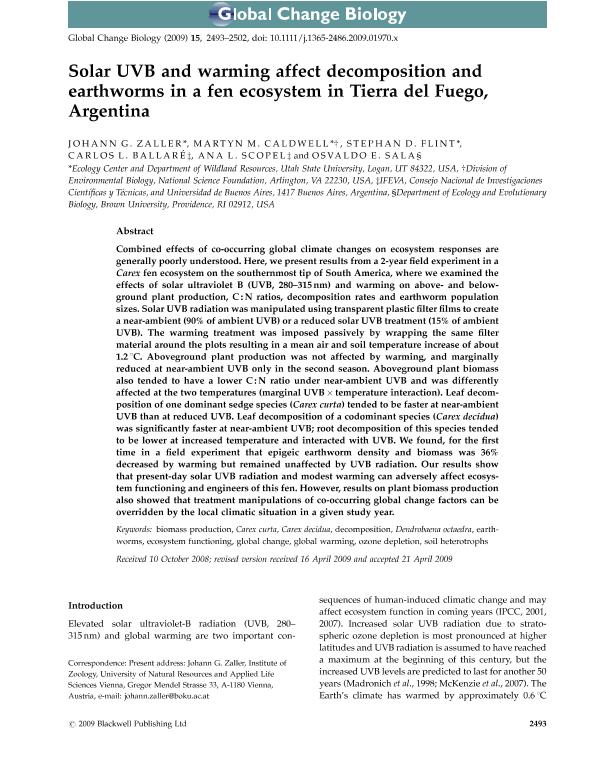Artículo
Solar UVB and warming affect decomposition and earthworms in a fen ecosystem in Tierra del Fuego, Argentina
Zaller, Johann G.; Caldwell, Martyn M.; Flint, Stephan D.; Ballare, Carlos Luis ; Scopel, Ana Leonor
; Scopel, Ana Leonor ; Sala, Osvaldo Esteban
; Sala, Osvaldo Esteban
 ; Scopel, Ana Leonor
; Scopel, Ana Leonor ; Sala, Osvaldo Esteban
; Sala, Osvaldo Esteban
Fecha de publicación:
10/2009
Editorial:
Wiley Blackwell Publishing, Inc
Revista:
Global Change Biology
ISSN:
1354-1013
e-ISSN:
1365-2486
Idioma:
Inglés
Tipo de recurso:
Artículo publicado
Clasificación temática:
Resumen
Combined effects of co-occurring global climate changes on ecosystem responses are generally poorly understood. Here, we present results from a 2-year field experiment in a Carex fen ecosystem on the southernmost tip of South America, where we examined the effects of solar ultraviolet B (UVB, 280-315nm) and warming on above- and belowground plant production, C:N ratios, decomposition rates and earthworm population sizes. Solar UVB radiation was manipulated using transparent plastic filter films to create a near-ambient (90% of ambient UVB) or a reduced solar UVB treatment (15% of ambient UVB). The warming treatment was imposed passively by wrapping the same filter material around the plots resulting in a mean air and soil temperature increase of about 1.2°C. Aboveground plant production was not affected by warming, and marginally reduced at near-ambient UVB only in the second season. Aboveground plant biomass also tended to have a lower C:N ratio under near-ambient UVB and was differently affected at the two temperatures (marginal UVB × temperature interaction). Leaf decomposition of one dominant sedge species (Carex curta) tended to be faster at near-ambient UVB than at reduced UVB. Leaf decomposition of a codominant species (Carex decidua) was significantly faster at near-ambient UVB; root decomposition of this species tended to be lower at increased temperature and interacted with UVB. We found, for the first time in a field experiment that epigeic earthworm density and biomass was 36% decreased by warming but remained unaffected by UVB radiation. Our results show that present-day solar UVB radiation and modest warming can adversely affect ecosystem functioning and engineers of this fen. However, results on plant biomass production also showed that treatment manipulations of co-occurring global change factors can be overridden by the local climatic situation in a given study year.
Archivos asociados
Licencia
Identificadores
Colecciones
Articulos(IFEVA)
Articulos de INST.D/INV.FISIOLOGICAS Y ECO.VINCULADAS A L/AGRIC
Articulos de INST.D/INV.FISIOLOGICAS Y ECO.VINCULADAS A L/AGRIC
Articulos(OCA PQUE. CENTENARIO)
Articulos de OFICINA DE COORDINACION ADMINISTRATIVA PQUE. CENTENARIO
Articulos de OFICINA DE COORDINACION ADMINISTRATIVA PQUE. CENTENARIO
Citación
Zaller, Johann G.; Caldwell, Martyn M.; Flint, Stephan D.; Ballare, Carlos Luis; Scopel, Ana Leonor; et al.; Solar UVB and warming affect decomposition and earthworms in a fen ecosystem in Tierra del Fuego, Argentina; Wiley Blackwell Publishing, Inc; Global Change Biology; 15; 10; 10-2009; 2493-2502
Compartir
Altmétricas



